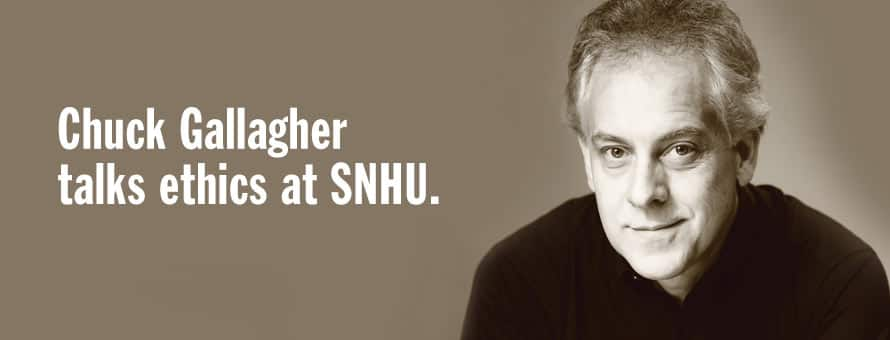Ethics Expert, Felon Speaks to Accounting Students

There comes a point in everyone's life when it's possible to choose to do the right or wrong thing. One day in 1987, Chuck Gallagher made the wrong choice, and 8 years later, he walked into a federal facility as prisoner number 11652-058.
Gallagher was a partner at an accounting firm in North Carolina. Over 3 years, he stole more than $250,000 from clients and spent 18 months in prison after pleading guilty. He's worked since then rebuilding his career and reputation and spends part of his time speaking to varied audiences about corporate ethics and culture and, as he told a group of Southern New Hampshire University accounting students recently, how easy it can be for otherwise well-intentioned people to make "dumb choices."
"What is the pattern of behavior that takes place?" he said. "Because of my past, I tend to focus on the behavioral side of why are we doing the things we're doing."
How Good People Can Do Bad Things
Gallagher now works as a vice president of sales and marketing and also spends a lot of time traveling the country to speak at colleges and large companies about corporate ethics. For the accounting students at SNHU, he had a relevant example. He first asked how many of them thought voluntarily breaking the law was unethical. Most everyone raised their hand. He then asked how many of them drive a few miles over the speed limit on the highway.
It's an imperfect example, he admitted, but also demonstrates that most people will bend or break the rules if they can rationalize their behavior as acceptable. Other cases audience members mentioned included lying to your children about Santa Claus, calling in sick to work when you feel fine or taking office supplies. None are on the level of embezzling hundreds of thousands of dollars but offer a window into his mindset in 1990 when he was supporting an extravagant lifestyle and thought of his scheme simply as a series of loans he would pay back.
Gallagher said that while there are many tools and systems to limit an accountant's opportunity to commit fraud, there's not enough conversation about what allows them to rationalize their behavior. That, he said, is why talking about ethics and corporate ethics programs like his are essential.
"Because I have lived through that, I'm not talking about theory," Gallagher said. "If I can use my story to illustrate the simplicity in which one thing leads to another and leads to another, at some point, it becomes easier for people to conceive of the possibility that it could happen to them."
Forging a Career After Prison
Gallagher has spoken to employees at dozens of companies, including Raymond James, State Farm, Lockheed Martin and the Federal Bureau of Investigation, according to his website. SNHU accounting professor Daniel Murphy invited him to speak to students in his Situational Ethics course after coming across Gallagher's blog.
Murphy said he was impressed that Gallagher took responsibility for his actions and worked to find ways to help others avoid his mistakes. He invited Gallagher to speak because he recognized a tendency for students to believe that bad actions are committed only by bad people.
"I wanted them to understand, in real-life terms, that bad decisions can be made by anyone who can justify why they are acting a certain way," he said. "I think it's important that students understand they must apply self-discipline and self-awareness to their work and ensure they don't put themselves in a position to act out unethical behavior."
Murphy said Gallagher's comments were well-received by students.
"The fact that Chuck was acting in the capacity of a Certified Public Accountant when he finally confessed really helped me drive home the point that our profession is no exception to wrong-doing and to help them understand the importance of own ethical behavior in our daily activities," he said.
Hoping to Help Others
Gallagher paid a hefty price for his choices. His marriage fell apart and, after prison, he was barred from the accounting field and was left trying to make a living as a convicted felon. He said he hopes following his presentation to students that their discussions in class resonate more than before.
"What I would love to see ... is that the quality of conversation around ethics changes, that there is a deeper recognition of what that pattern is," he said. "Perhaps they will not make the choice that I made."
Joe Cote is a staff writer at Southern New Hampshire University. Follow him on Twitter @JoeCo2323.
Explore more content like this article

For Jazzmen Shipp, Earning a Degree Changed Everything

How Kellsie Goodhart-Jones Earned an MBA While Working for the US Air Force

What Jobs Can You Get with a Business Degree?
About Southern New Hampshire University

SNHU is a nonprofit, accredited university with a mission to make high-quality education more accessible and affordable for everyone.
Founded in 1932, and online since 1995, we’ve helped countless students reach their goals with flexible, career-focused programs. Our 300-acre campus in Manchester, NH is home to over 3,000 students, and we serve over 135,000 students online. Visit our about SNHU page to learn more about our mission, accreditations, leadership team, national recognitions and awards.


